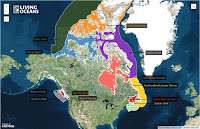 |
| Learning to fillet salmon. Photo: Sonia Strobel |
Workshop details
Register online for the workshopsCooking
A hands-on workshop that covers the basics and foundations of how to cook with salmon. Recipes will be different for each workshop. The workshop will include tastings for all participants and attendees will be sent home with copies of the recipes.
Maximum 8 participants per workshop. $52* per person per class.
- Tuesday, Aug. 18, 6:00 – 9:00 pm at Save On Meats, 43 W. Hastings St., Vancouver
- Tuesday, Sept. 15, 6:00 – 9:00 pm at Save On Meats, 43 W. Hastings St., Vancouver
Buying whole fish is often the most economical, as long as you don’t butcher the fish! Come master your knife skills in this hands-on workshop where you will get to fillet your own fish and vacuum seal it to bring it home.
Maximum 8 participants per workshop. $57* per person per class.
- Thursday, June 25, 6:00 – 8:00 pm at Save On Meats, 43 W. Hastings St., Vancouver
- Thursday, July 16, 6:00 – 8:00 pm Save On Meats, 43 W. Hastings St., Vancouver
Canning salmon is one of the best ways to preserve the ocean’s bounty for the winter months and this demo-style workshop will teach you all the tricks of using a pressure canner. Workshop participants will take home a step-by-step salmon canning guide and a small jar of canned salmon.
Maximum 12 participants per workshop. $32* per person per class.
- Tuesday, Sept. 29, 6:00 – 8:00 pm at Save On Meats, 43 W. Hastings St., Vancouver
*$2 from the registration fee will go towards supporting ‘train-the-trainer’ workshops at local community kitchen spaces to help increase cooking skills and capacity in vulnerable populations.
Skipper Otto’s first started teaching people how to prepare salmon at Fisherman’s Wharf at Granville Island in Vancouver. Year after year the workshops have grown in popularity as people get more interested in eating locally and preparing their own gourmet meals. This year, they’re being held at the Save On Meats Community Kitchen at 43 W. Hastings.
Doris Gnandt and Serena Chu will be the chefs guiding the workshop with Doris handling the cooking and filleting and Serena taking care of the canning sessions.
  |
| Doris Gnandt (left) believes you should cook from the heart and it shows in her filleting and cooking demos. Serena Chu (right) likes to make things that are irresistibly tasty but actually healthy! |
Skipper Otto’s filleter extraordinaire Rumi Hokubay practices the
traditional Japanese method of filleting called San-Mai Ni Orosu.
Participants in the Filleting Salmon workshops will get to fillet their own fish, vacuum seal it and bring it home!
The Salmon in the Kitchen workshop series creates community around—and awareness of—our local fisheries. Most of the fresh, local, sustainable fish caught by fishermen on the South Coast is exported or sent directly to high-end restaurants. As a result, over 80% of the seafood bought in Vancouver is imported. By teaching people the skills and knowledge about local seafood and how to handle it, we increase the value of the fishery to the local community. This in turn makes the local seafood supply chain more resilient and lends to increased food security in our community.
The workshops aren’t all work though. There’s a lot of fun involved too. And food. If you attend the Cooking with Salmon workshop don’t eat a big dinner beforehand, as you’ll need a good appetite to taste the recipes you’ll be cooking.
We are grateful to our local partners and sponsor – Skipper Otto’s Community Supported Fishery, Save on Meats, Vancity enviroFund, and the Vancouver Foundation Greenest City Fund.




